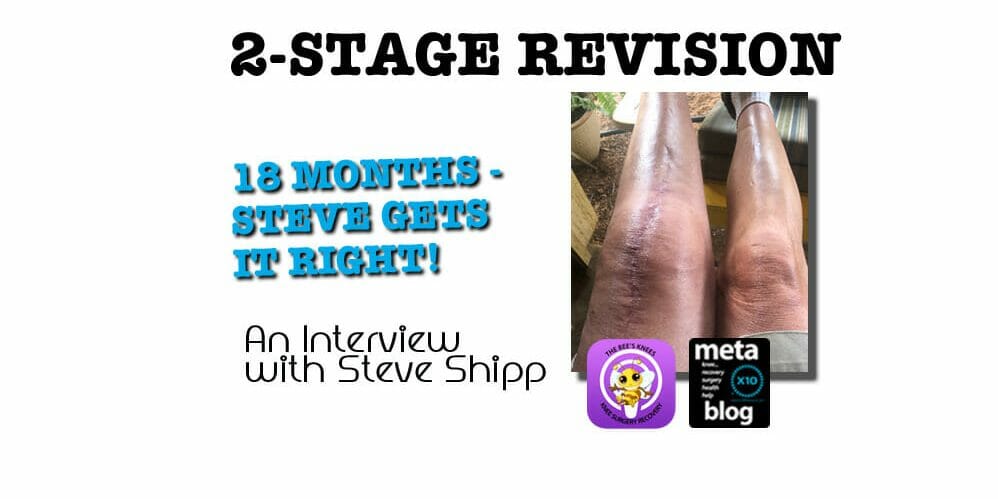Podcast: Play in new window | Download (Duration: 50:50 — 69.9MB)
Subscribe: Apple Podcasts | Spotify | TuneIn | RSS | More
TKA Infection Two-Stage Knee Revision (Steve’s Story)
An interview with Steve Shipp
We are so pleased to share this interview with Steve for The Bee’s Knees Podcast and KNEE RADIO 1.

The Two-Stage Knee Revision Surgery
Two-stage reimplantation is considered the gold standard for the management of periprosthetic joint infection. The first stage involves the removal of the prosthesis, followed by extensive debridement of all nonviable tissues, synovectomy, irrigation, and reaming of the medullary canals. Once the joint has been prepared, antibiotic-impregnated cement beads and/or spacer are inserted. Antibiotic-impregnated spacers are now more commonly used, and an increasing number of orthopaedic surgeons are using articulating spacers if indicated. Antibiotics are then prescribed to the patient based on the sensitivities of the infecting organism. The duration of systemic antibiotic use is decreasing, and short courses of antibiotic therapy have been shown to be as efficacious as prolonged therapy between the first and second stages. The second stage of the procedure involves removal of the antibiotic-impregnated cement beads and/or spacer, repeat irrigation and debridement, and final reconstruction with revision components. While two-stage reimplantation was considered the gold standard in many parts of the world, recent studies have demonstrated that it is associated with a considerable failure rate. This may be due to the lack of accurate diagnostic tools for infection eradication, and future investigation of risk factors for failure of the two-stage reimplantation should be conducted.
Source: Two-Stage Reimplantation in Infected Total Knee Arthroplasty
Scars are like tattoo’s, with better stories. – Steve Shipp



Steve’s Knee Replacement Journey 2019 / 2020
It took nearly 18 months for Steve to find success after his TKA (Total Knee Arthroplasty). In fact, it took multiple surgeries, the last stage in the middle of the pandemic: Steve’s surgeon came down with COVID-19 in fact. This is the timeline:
- May 2019 Left Total Knee Replacement
- Extensive Rehab in Outpatient Setting
- October 14 2019 Ankle Fusion
- Ankle Rehab / Knee Rehab
- Happy 30th Wedding Anniversary!
- December 2019 Knee Arthroscopy
- The determination that the Knee is Infected
- March 2020 Stage One Knee Revision (Removal of Hardware)
- COVID-19 Hits
- Limited Movement
- May 2020 Stage Two (Final Stage) Knee Revision
- Final Placement of Hardware
- Knee Rehab Begins with X10 Therapy
- August 2020 Rehab Concludes for Steve’s Two-Stage Knee Revision
- 130º Range of Motion
- Full Activity | Back to Full Strength




KNEE RADIO 1 (powered by The Bee’s Knees Podcast)
This interview is available exclusively on The Bee’s Knees Podcast and on KNEE Radio 1, a new radio station engineered to help the millions of knee surgery patients each year. You can listen to KNEE RADIO 1 right here: KNEE RADIO 1

Our entire clinical team was so pleased with Steve’s recovery with X10 Therapy. And a special thanks to Steve for taking the time to do the interview to “pay it forward” for the next TKA infection two stage revision patient in need of help.
The X10 Meta-Blog
We call it a “Meta-Blog.” We step back and give you a broad perspective on all aspects of knee health as with this article on ‘TKA Infection Two-Stage Knee Revision (Steve’s Story)’.
In this one-of-a-kind blog we gather together great thinkers, doers, and writers. All our work is related to Knee Surgery, Recovery, Preparation, Care, Success and Failure. Meet physical therapists, coaches, surgeons, patients, and as many smart people as we can gather to create useful articles for you. This is for you if you have a surgery upcoming, or in the rear-view mirror. Or maybe you just want to take care of your knees to avoid surgery. Executive Editor: PJ Ewing
To subscribe to the blog click here.
Two resources for you below to help with knee replacement pain management. Both are email series that we created to help those who need some additional thinking for pre-surgery and post-surgery.











